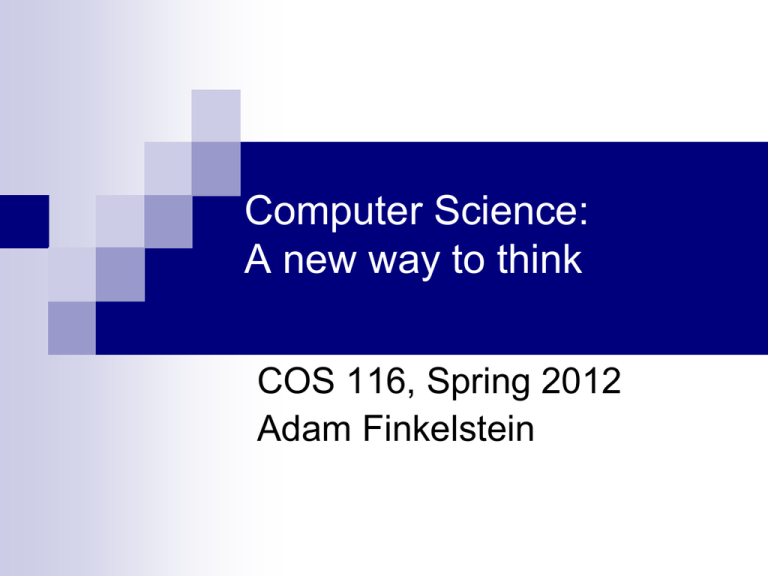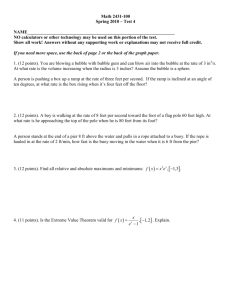ppt - Princeton University
advertisement

Computer Science: A new way to think COS 116, Spring 2012 Adam Finkelstein “Computer science is no more about computers than astronomy is about telescopes.” Edsger Dijkstra. Today: Computer science ideas have led to a rethinking of Epistemology, Physics, Statistics, Economics, Biology, Social Sciences, Privacy, etc. Field 1: Mathematics Traditional math proofs (recall our discussion of axiomatic math): one needs to check every line PCP Theorem[A., Safra, Lund, Motwani, Sudan, Szegedy1992,..] Every math theorem has a proof that can be probabilistically checked by looking at 3 bits in them. Not trivial! Implies that computing approximate solutions to CLIQUE is tantamount to computing optimal solutions. Field 2: Epistemology (theory of the nature and grounds of knowledge especially with reference to its limits and validity.) Zhuang Tse: “See how the small fish are darting about in the river. That is the happiness of the fish.” Hui Tse: “You are not a fish yourself. How can you know the happiness of the fish?” Zhuang Tse: “And you not being I, how can you know that I do not know?” [Zhuang Tse, 300BC.] (Epistemology 1): Public closed-ballot elections Hold an election in this room s.t. •Voters can speak only publicly. • At the end everyone must agree on who won and by what margin • No one should know which way anyone else voted Is this possible?? Answer: Yes [Yao’85,GMW’86] “Privacy-preserving Computations” “Whatever you see from others, you could have produced yourself, with no interaction.” Epistemology 2: Asset bubbles • Tulip bubble in Netherlands, 1630s • South Sea bubble in England, 1720 • …etc… • dot-com bubble, 1990s • real estate bubble, 2001-08. “ I can calculate the motions of the heavenly bodies, but not the madness of people.” -- [Isaac Newton] (Newton lost money in South Sea bubble.) Also a challenge to modern economic theory. Keynes: stock market vs. beauty contests It is not a case of choosing those [faces] that, to the best of one’s judgment, are really the prettiest, nor even those that average opinion genuinely thinks the prettiest. We have reached the third degree where we devote our intelligences to anticipating what average opinion expects the average opinion to be. And there are some, I believe, who practice the fourth, fifth and higher degrees.” (J. M. Keynes, General Theory of Employment, Interest and Money, 1936). Keynes: stock market vs. beauty contests 1st degree thinking: pick the stock you like best. 2nd degree thinking: pick stock that is best by 1st order thinking 3rd degree thinking: pick the stock that is best by 2nd order thinking… “Impossibility of bubbles” (backwards induction argument): Suppose bubble will burst in 30 days and everybody knows it. Anticipating this, smart investors will exit the market on day 29. Realizing this, smart investors should exit on day 28, etc.…. If market has enough rational investors, bubble cannot form.” Meanwhile, over in computer science…. In 1970s and 1980s (continuing since), great interest in what can or cannot be achieved by distributed systems of processors with unreliable communication…. Coordinated attack problem [Gray’78]+ many others Two generals in an army. If attack enemy simultaneously, they win. If only one attacks, the enemy wins. General A “Lets attack at dawn!” Messenger Got your message. Agreed! General B Messenger Can B go ahead and Can A go ahead and Got your reply attack at dawn?? Messenger attack at dawn?? Can A go ahead Can B go ahead and and attack attack at at dawn?? dawn?? No! Messenger could be intercepted and killed! Attack possible iff “A knows that B knows that A knows….” Common knowledge (Halpern and Moses, ’84,’90). Unachievable with unreliable message passing. approximate common knowledge achievable! Dynamic model for bubbles [Brunnermeier, Abreu 2002] • Market contains both irrational and rational agents • Irrational agents cause bubble. • Rational agents willing to prick bubbles, but require a coordinated attack (if too few attack, they lose!) • Bubbles last until bubble’s existence is “approximate common knowledge.” (Before then, rational to join bubble!). • Synchronization mechanisms inspired by “asynchronous clocking” in distributed computing. Schelling Points on 3D Surfaces [Chen 2012] Field 3: Finance “Computational intractability of pricing financial derivatives and its economic effects.” (Arora, Barak, Brunnermeier, Ge 2010) Crash of ‘08 (in 1 slide) Relative Market Sizes Lesson Learnt Small Error in Derivatives Huge Effects in Economy Example of derivative Contract Seller to Pay Buyer $1M if DOW >11,000 one year from today “Fair price” = $1M X Pr[ DOW >11,000 ] Derivative implicated in ‘08 crash: CDO (collateralized debt obligation) CDOs: Simplistic explanation Imagine 100 mortgages, each $1M, default probability 10%. Expected total yield: $90M Create two tranches: senior and junior. Senior gets first $70M of yield; junior gets rest Senior tranche less risky, attractive to pension funds etc. Junior tranche more risky, attractive to hedge funds Senior Junior The recent financial crisis had many causes: regulatory failure, incorrect modeling, excessive risk-taking. All of these contributed to mispricing of derivatives. Qs. Even if we fix these issues, is there still an issue with derivative pricing? [ABBG’10]: Probably yes. (Even in case of everyday CDOs.) Even if models are correct, pricing involves solving computationally intractable problems!! Negates some of their theoretical advantages. Field 4: Physics “I think I can safely say that nobody understands Quantum Mechanics” The only difference between a probabilistic classical world and (the quantum one) is that… the probabilities would have to go negative. Usual vs “Negative” probabilities o o o quantum N classical bits o Do quantum operation on each. Randomly flip each one. System is in “probabilistic superposition”; each of 2n configurations has associated nonnegative probability. amplitude that could be -ve Quantum mechanics can be used to factor Integers efficiently. [Shor94] Is quantum mechanics correct?? Field 5: Statistics “development and application of methods to collect, analyze and interpret data.” Computer science versions: “machine learning”, “data mining”, etc. (Aside: is “learning from experience” = “Automatized statistics”??) Rest of lecture: Man + machine “Singularity”: When machine intelligence overtakes ours. Thoughts about Deep Blue • Tremendous computing power (ability to “look ahead” several moves) • Programmed by a team containing chess grandmasters. • Had access to huge database of past chess games. • Used machine learning tools on database to hone its skills. “Human-machine computing” Aside: Humans + Cheapo Chess software > Best Chess Software Another example of human-computer computing… Olde dream: “central repository of knowledge; all facts at your finger-tips. How it happened: 100s of millions of people created “content” for their own pleasure. Powerful algorithms were used to extract meaningful info out of this, and have it instantly available. “Second Life” • Online community where everybody acquires an “avatar.” (Piece of code; point-and-click programming as in Scribbler.) • Avatar customizable but follows laws of physics in imaginary world (remember: weather simulation) Weird 2nd life facts Ability to buy/sell. (“Linden dollars”) Budding markets in real estate, avatar skins, clothes, entertainment, “teaching” avatars new skills, etc. Emerging political systems Interface with real world (eg Swedish embassy!) An interesting viewpoint: Second-Lifers are teaching the computer what “human life” is. (Analogies: Chess database and Deep Blue, WWW and Google.) The most interesting question in the computational universe in the foreseeable future Not: “Will computers ever be conscious?” But: Where will all this take us? (and our science, society, politics,…) Administrivia • One final blogging assignment (due May 6): Write 2-3 paragraphs about AI, your expectations about it before you took this course, how they were shaped by this course, and the Searle article. • Review sessions, probably afternoon of May 6. • Final Exam Fri May 13, 7:30pm Want to join COS major? Take a programming class in the summer and skip COS126. Good luck with the final and have a great summer! Enjoy your time in the computational universe!



